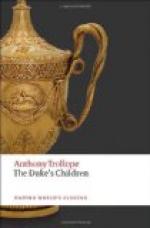The Duke said that he would think about it, and then had told Mr Morton that he was to pay the bill for this new toy. He had thought about it, and had assured himself that driving a coach and four was at present regarded as a fitting amusement for young men of rank and wealth. He did not understand it himself. It seemed to him to be as unnatural as though a gentleman should turn blacksmith and make horseshoes for his amusement. Driving four horses was hard work. But the same might be said of rowing. There were men, he knew, who would spend their day standing at a lathe, making little boxes for their recreation. He did not sympathise with it. But the fact was so, and this driving of coaches was regarded with favour. He had been a little touched by that word his son had spoken, ‘Ah,—if I could be like you!’ So he had given the permission; the drag, horses, harness, and grooms had come into the possession of Lord Silverbridge; and now they were put into requisition to take their triumphant owner and his party down to Epsom. Dolly Longstaff’s team was sent down to meet them half-way. Gerald Palliser, who had come up from Cambridge that morning, was allowed to drive the first stage out of town to compensate him for the cruelty done to him by the University pundits. Tifto, with a cigar in his mouth, with a white hat and a blue veil, and a new light-coloured coat, was by no means the least happy of the party.
How that race was run, and how both Prime Minister and Quousque were beaten by an outsider named Fishknife, Prime Minister, however, coming in a good second, the present writer having no aptitude in that way, cannot describe. Such, however, were the facts, and then Dolly Longstaff and Lord Silverbridge drove the coach back to London. The coming back was not triumphant, though the young fellows bore their failure well. Dolly Longstaff had lost a ‘pot of money’, Silverbridge would have to draw upon the inexhaustible Mr Morton for something over two thousand pounds,—in regard to which he had no doubt as to the certainty with which the money would be forthcoming, but he feared that it would give rise to special notice from his father. Even the poor younger brother had lost a couple of hundred pounds, for which he would have to make his own special application to Mr Morton.
But Tifto felt it more than anyone. The horse ought to have won. Fishknife had been favoured by such a series of accidents that the whole affair had been a miracle. Tifto had these circumstances at his fingers’ ends, and in the course of the afternoon and evening explained them accurately to all who would listen to him. He had this to say on his own behalf,—that before the party had left the course their horse stood first favourite for the Leger. But Tifto was unhappy as he came back to town, and in spite of the lunch, which had been very glorious, sat moody and sometimes even silent within his gay apparel.
‘It was the unfairest start I ever saw,’ said Tifto, almost getting up from his seat on the coach so as to address Dolly and Silverbridge on the box.




